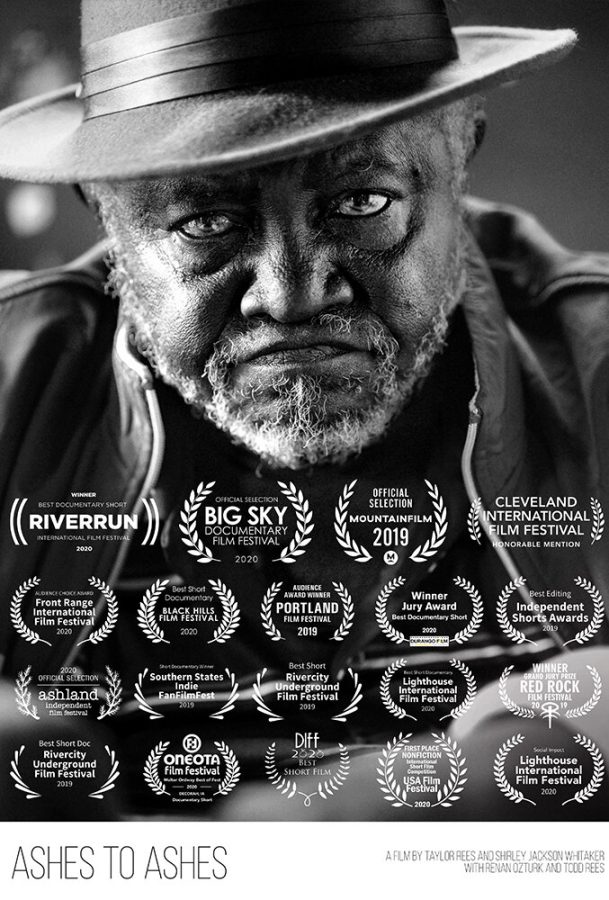In honor of Black History Month, the University of Massachusetts College of Humanities and Fine Arts hosted a virtual screening on the evening of Wednesday, Feb. 23 of Taylor Rees’ award-winning short documentary, “Ashes to Ashes,” followed by an hour-long discussion with artist and activist Dr. Shirley Whitaker.
The film was awarded “Best Documentary Short” at the 2020 River Run International Film Festival and was considered for an Academy Award, according to UMass’s event website. Rees’ film also received awards at the Cordillera International Film Festival and Lighthouse International Film Festival.
“Ashes to Ashes” tells the story of avid Star Wars fan and master leatherwork artist Winfred Rembert, a survivor of an attempted lynching in Cuthbert, Georgia in 1967. The film also brings to light the extraordinary friendship between Winfred and Whitaker. Rees’ goal and her dream is to memorialize the forgotten 4,000 African-Americans lynched during the Jim Crow era through a special home-going ceremony, entitled “Ashes to Ashes,” according to her website.
Dr. Whitaker, a resident of Amherst, is an artist, activist and kidney specialist. According to her website, she grew up in Waycross, GA, and earned a Master’s of Public Health at the Yale University School of Medicine. She then received her Doctor of Medicine in 1979 from Emory University School of Medicine and continued her advanced training in Internal Medicine and Nephrology in Virginia, California and Oregon.
Aside from her impressive resume in the medical field, Whitaker pursued her love for art from a young age. Her work consists of etchings, paintings, photography and pencil drawings.
“Dr. Whitaker had an early love for art which she has been able to weave into all aspects of her life. She was the art protégé of one of America’s leading artists, the late Leonard Baskin, who taught her printmaking process of etching,” Whitaker’s website reads.
The event began with a welcome from the Dean for the College of Humanities and Fine Arts Barbara Krauthamer, who introduced host Evan Lewis, assistant dean for community outreach and program development within the college.
Following the screening, there was a discussion between Lewis and Whitaker regarding the subjects and themes portrayed in the documentary. Lewis presented Whitaker with a series of questions until opening the floor to an audience Q&A.
“Dr. Whitaker and I will begin a conversation that hopefully will give us an opportunity to dig a little deeper into the really amazing work that [she has] done. And hopefully to tease out some of the inspirations that led her to do this truly pioneering work,” Lewis explained.
Whitaker spoke of her friendship with Rembert, who passed away in March 2021.
“We came from South Georgia and that helped us to bond…when I walked in that house, Winfred knew my name and I knew his,” Whitaker said.
Both Whitaker and Rembert shared an immense love for art, although their styles were often different from one another. Rembert’s leatherwork usually dawned bright colors compared to Whitaker’s more muted choice of color style.
“We could talk about Winfred’s work. When people go to see Winfred’s work, you’ll see how colorful it is. And as you know, Winfred, if I had gone through what you’ve gone through my rainbow will be black, blue and brown. That’s it,” Whitaker explained.
“But he said in the film that he didn’t paint gloom, he painted hope.”
Whitaker emphasized the method of delving into one’s past to help their future. While she preaches this concept regarding racial history in America, it has also aided her in the medical field when assessing patients. Whitaker told the story of a patient whose history of hearing loss helped her to diagnose his kidney problem.
“In talking with him, I learned more history that the type of kidney problem he had was hereditary. And his grandson has the same hearing loss that he has. So, whoever is managing the care of his grandson needs to know that history to make sure they monitor and try to lessen the impact that kidney failure would have on this young person,” Whitaker said.
Lewis and Whitaker discussed the value of remembering history, specifically the history of lynching, rather than forgetting it. Whitaker’s hope in helping heal racial inequalities in America is by the country’s history of lynching.
“History: Look back on it, acknowledge it, and try to get strength from it and not let it destroy you. Our country is so ingrained in not acknowledging our history,” Whitaker continued.
“We cannot un-ring that bell of someone being lynched. But it’s imperative that we acknowledge it and help them with their passage on to where our ancestors are, and we learn and grow and heal so that our future will be stronger and better.”
Jack Underhill can be reached at [email protected] and followed on Twitter @jackunderhill16.




















